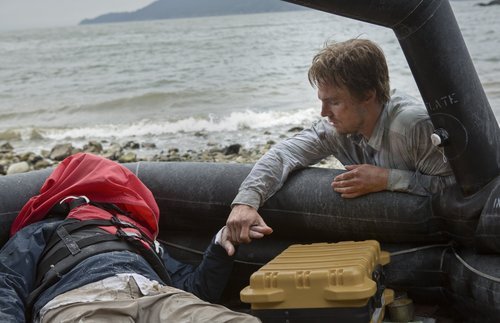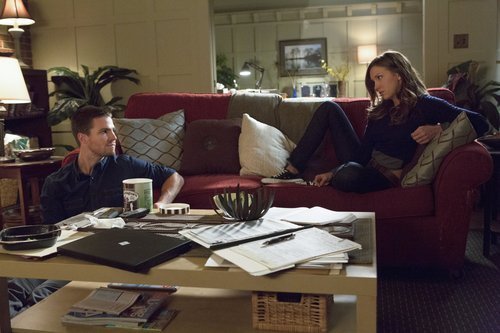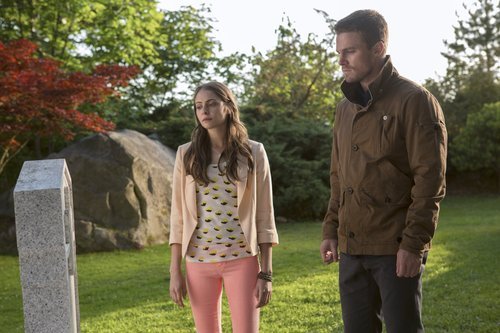A second episode can only build on that preliminary groundwork. But without the novelty of throwing characters together for the first time, and without having extensive storylines and relationships in play (as any series will have later in its run), a second episode is almost invariably made up of a. more setup and b. a really lame plot.
Seriously, cast your mind back over all the second episodes of all the television shows you’ve ever watched. Do any of them stand out?
Arrow is no exception. The A-Plot of Honour Thy Father revolves around a corrupt businessman called Martin Somers who steals money from pensioners, but is also suspected of murdering a stevedore who witnessed his drug trades with the Chinese Triads. Laurel is bringing a civil suit against him on behalf of the victim’s daughter, but that only puts her in danger from a Chinese assassin that Somers sends after her.
Yeah, no one really cares about this stuff.
It’s the flashbacks to the island, Oliver’s interaction with those around him, and the little notes of character intrigue strewn throughout that are of most interest. If the second episode achieves anything, it’s establishing the duality of personality and purpose that Oliver has to balance if he’s to honour his father’s wishes (whilst appearing to disrespect his legacy). Much like how Bruce Wayne cleared Wayne Manor in Batman Begins by behaving like a drunken degenerate, Oliver is putting up a front of disrespect and irresponsibility in order to cloud everyone’s perception of what’s really going on with him.
 |
| Hopefully the mystery-archer on the island can provide some therapy for this. |
Yet in saying that, his decision to sabotage the ground-breaking ceremony had an entirely unforeseen advantage, one he doesn’t seem to be aware of yet. After Moira and Walter try to get him involved in the family business, he decides to go the extra mile and make a scene out of rejecting their offer ... only for us to be privy to Moira telling an off-screen individual that it proves Oliver knows nothing about the yacht being sabotaged.
I suppose the question over whether this is true or not still lingers, but I suspect Moira is right. Ollie is playing to an audience of potential enemies, but I don’t think he’s aware that his mother is a part of that particular audience. She’s in the one that has to be kept at arm’s length by Ollie’s insistence on playing the fool. And there’s plenty of poignancy to be found in the fact that the people Ollie loves most has to perceive him as an irresponsible playboy if he’s to pull off his on-going vengeance spree.
So why go to Laurel? Well, from a storytelling perspective it was a rather clumsy way of getting him inside her apartment so he can rescue her from Kelly Hu, but I also like to think that a part of him feels that since she was the one he hurt the most, her forgiveness will grant him the most vindication for his current choices. The more hard-won the approval, the more it’s worth, or so Mr Darcy would say.

As with last week, I can see why Laurel-hate exists without feeling it myself. She’s abrasive to Oliver as a result of him clearly telling her to stay away from him, only for him to turn up at her doorstep with ice-cream. Mixed signals, much? Yet the narrative immediately undermines her reluctance to let him in by making him a necessary part of thwarting the assassination attempt. And then again when the entire case she’s been building against Somers is rendered null and void by the recorded confession that Oliver forces out of him.
This would have been a good episode to establish her as a gifted attorney, but instead the plot has her caught between the overprotectiveness of Oliver and her father. Understandably Quentin freaks out over the safety of his last remaining daughter, but having her put under police protection at her workplace without her permission was somewhat out-of-line.
And sure, she could have been a little more understanding about why he was doing it, but his line “I will lock you in a cell if that’s what it takes!” demonstrates a level of paranoia and control that makes Laurel’s bid for independence and personal responsibility a lot more justified.
And lest we forget, she spent this entire episode tending to the legal needs of a grieving daughter at great personal risk to herself. It’s a shame that the episode downplayed that in favour of Ollie/Quentin, though at least she gets a line that makes it explicitly clear that her motivation was all about Emily.
***
There was a nice nod to realism what with the proof of life declaration in the courtroom; I only wish that there had been more of this throughout the episode (hopefully there’s more to come). This was something that was strangely missing from Buffy’s resurrection over on Buffy the Vampire Slayer, though I’m sure there are all sorts of interesting legal hoops to jump through if a person is declared dead only to return in full health (hey, it happens). It would be nice to see some of it unfold on-screen, and that’s not even going into the bevy of doctors, lawyers and therapists should surely be lining up to help reintegrate Ollie into his old way of life.
Heck, it’s a wonder that doctors haven’t already voiced their astonishment that Ollie’s physique and mental health is nothing at all like that of a man that’s been stranded on deserted island for five years. Yet only Diggle seems to have noticed that Ollie really isn’t acting like a man suffering from PTSD...
So the plot thickens in a number of different threads, just not the one that made up the bulk of this episode’s storyline. Call it the price of the second episode: still setting up the groundwork, just beginning to weave things into place, caught by the necessity to deliver a self-contained storyline.
Miscellaneous Observations:
Yikes. What’s up with Thea’s wardrobe? The hairstylist loves her, but the costume designer seems to be holding a grudge.
 |
| She's not actually wearing pyjamas, right? |
With all the paparazzi lunging and screeching at Ollie every chance they get, it’s a wonder that he can sneak out for his night-time adventures at all. Those scenes reminded me why I never, ever want to be a famous person. My claustrophobia just couldn’t handle that sort of invasive mobbing – it was difficult to even watch it.
Between Oliver speaking Russian last episode and Chinese this episode, it became apparent long before that final scene that he probably wasn’t the only person on that island. He’s been trained by someone, which opens up a multitude of questions concerning who, how and why. And was it just me, or were the pages of Robert Queen’s notebook in that flashback totally blank? Which suggests that someone else filled them with names. Of course, I haven’t forgotten that glimpse of Slade’s mask...
I’m glad that Diggle clearly isn’t stupid, and in order to keep doing what he’s doing, Oliver will probably have to let him in on the secret in the near future. The actor has a nice presence, whether quietly listening to conversations in the background or taking affirmative action in dangerous situations. And nice touch that he not only realizes something’s up with Oliver’s aiming skills, but that he’s already recognised that Ollie isn’t as messed up as he should be after five years of isolation.
Quentin Lance places an arrow in Somers’s desk in order to prove that Arrow was there, only to LEAVE it there when he walks away. Isn’t it important evidence? Equally daft was leaving Laurel by herself minutes after the assassination attempt in order to get to the docks. C’mon – he wouldn’t have left her by herself, and his colleges wouldn’t have radioed him after his daughter was nearly killed.
But I recognise the actor now. He was a minor character in a very funny Jonathan Creek subplot.
Also nice to see Kelly Hu again, though I wouldn’t have recognised her in that wig if I hadn’t already seen her name in the opening credits.
 |
| Because if you dress in a white wig and a leather catsuit, no one will ever suspect you're out to kill them. |
No comments:
Post a Comment